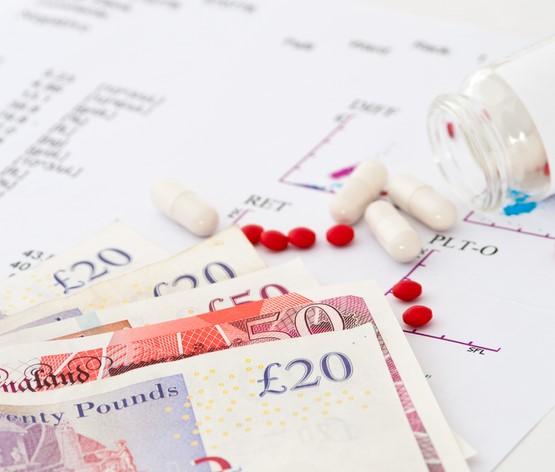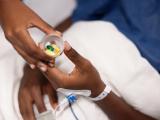The UK government today released a new plan to tackle antimicrobial resistance (AMR) that aims to reduce drug-resistant infections, cut human and animal antibiotic use, and provide incentives to pharmaceutical companies for developing new antibiotics.
The 5-year national action plan calls for a 10% reduction in the number of antibiotic-resistant infections in people by 2025, a 15% decrease in human antibiotic use by 2024, and a 25% decrease in the use of antibiotics in food-producing animals by 2020. To encourage development of new antibiotics, the government will test a new payment model that will reimburse pharmaceutical companies based on how valuable their drugs are to the National Health Service (NHS), rather than on the quantity of antibiotics sold.
"Through this plan we are setting out our challenge to ourselves and to other countries to continue our excellent work together to preserve and develop these essential medicines for generations to come and help us address one of the most pressing global health challenges we face this century," Michael Gove, the UK's secretary of state for environment, food and rural affairs, and Matt Hancock, MPhil, health and social care secretary, write in the foreword to the plan.
The plan was released along with a 20-year vision for how the United Kingdom will sustain its efforts against antimicrobial resistance. Hancock announced the plan today at the World Economic Forum in Davos, Switzerland.
Reducing infections, optimizing antibiotics
The plan lays out three key ways in which the government will take action against AMR: reducing the need for antimicrobials by lowering the burden of infection in humans and animals, optimizing antimicrobial use in humans and animals through better stewardship, and investing in research and development of new antibiotics, diagnostics, and vaccines.
Within each of these areas are specific strategies. These actions include strengthening infection prevention and control in hospitals, developing real-time data on patients' treatment and resistance history, promoting better animal husbandry practices, strengthening antimicrobial stewardship programs, limiting antibiotic contamination of water and soil, and collecting better data on drug-resistant pathogens in humans and animals.
The government says it will implement the plan using a risk-based approach and will target interventions that are likely to have the most impact.
The plan aims to build on the success of the previous UK 5-year AMR strategy, which was launched in 2013 with the aim of improving knowledge and understanding of AMR, conserving antibiotics, and stimulating development of new treatments for drug-resistant infections. Since 2013, sales of veterinary antibiotics in the United Kingdom have fallen by 40%, with sales of medically important antibiotics falling by 52%. In addition, human antibiotic use fell by more than 7% from 2014 to 2017.
Despite those reductions in people and animals, drug-resistant bloodstream infections in the United Kingdom rose by 35% from 2013 to 2017. One of the new plan's goals is to cut the number of gram-negative bloodstream infections in half by 2025.
Under the 20-year vision, the government says it will use a series of 5-year plans to achieve rates of resistant infections that are among the lowest in the world, demonstrate optimal antibiotic use in humans and animals, drive innovation, and secure sustainable access to old and new antibiotics.
New payment model
The intention to test a new payment model for antibiotics also suggests the government desire to promote research and development of new antibiotics.
Hancock told the BBC that the current payment model, which bases reimbursement on the volume of drugs sold, encourages pharmaceutical companies to sell as many antibiotics as they can. At the same time, it discourages the companies from developing new antibiotics, because any new drug would likely be kept in reserve as long current antibiotics remain effective.
"If you just buy the drugs in a direct way from the drug companies, the commercial incentives are to keep pumping out the old antibiotics," Hancock said. "But the bugs are gradually becoming resistant to those antibiotics, so we need to change the way we buy antibiotics in order to incentivize the development of new ones."
Under the new model, Hancock explained, the NHS will experiment with buying an antibiotic "service" from drug companies, paying them up-front for access to effective antibiotics. "We will buy antibiotics that work from you, and we will make sure that the funding is there, so that if we need an antibiotic, it will be available," he said.
A payment model that delinks profits from the volume of antibiotics sold and pays companies for the public health value of a new antibiotic is the type of "pull" incentive that antibiotic development advocates believe is necessary to get more new antibiotics into the pipeline. According to a recent analysis by the Pew Charitable Trusts, only 11 antibiotics that target the most serious antibiotic-resistant pathogens are currently in clinical trials. And because of the economic challenges, many drug makers have been abandoning their antibiotic research programs.
CARB-X Executive Director Kevin Outterson, JD, says the model demonstrates "serious global leadership" by the UK government, which has been working with the pharmaceutical industry over the last 2 years to develop the idea.
"This UK pilot project will be the world's first delinked pull incentive for antibiotics," Outterson told CIDRAP News. "The revolutionary step is paying for novel antibiotics based not on volume of sales, but value to patients and society. Antibiotic stewardship can be foremost in this model, while also supporting innovation."
See also:
Jan 24 UK 5-year national action plan
Jan 24 UK 20-year vision for antimicrobial resistance
Jan 24 BBC story
























